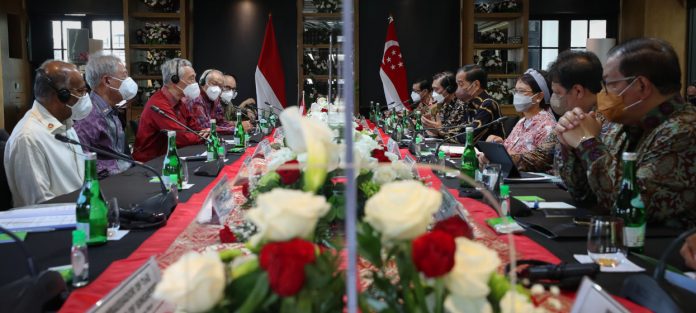The recent signing of three treaties — a Flight Information Region agreement, a Defence Cooperation Agreement and an extradition treaty — augurs well for relations between Indonesia and Singapore. It is also a boost to regional security.
Earlier this week, Indonesia and Singapore signed three important treaties: a Flight Information Region (FIR) agreement, a Defence Cooperation Agreement (DCA), and an extradition treaty. The three treaties are the culmination of more than a decade of diplomacy and negotiation, and should help bolster bilateral cooperation and regional security.
Speaking at the fifth Leaders’ Retreat in Bintan on Tuesday, Indonesia President Joko Widodo said the bilateral cooperation in law enforcement, aviation safety and defence and security will ‘continue to be strengthened based on the principle of mutual benefit’. Speaking after the President, Singapore’s Prime Minister Lee Hsien Loong said the treaties settled long-standing bilateral issues. The agreements ‘take into account both parties’ interests, represent a good balance of benefits, and are durable agreements for the long haul, designed to last for at least a generation.’
The FIR agreement involves a realignment of the boundary between the Jakarta FIR and Singapore’s FIR. The extradition treaty will grant extradition for a comprehensive list of offences. Both the extradition treaty and the DCA were signed in 2007 and were to be implemented concurrently. But Jakarta failed to ratify the agreements.
The DCA signing is important and a boost to bilateral relations. The DCA has long historical roots. In 1995 Indonesia and Singapore signed a Military Training Area (MTA) agreement which gave Singapore the right to conduct military exercises in Indonesian archipelagic waters of Tanjung Pinang and the southern reaches of the South China Sea. However, the MTA was re-evaluated in 2003. Indonesia protested and argued that Singapore’s military exercises often exceeded the area demarcated and had involved other countries such as the United States and Australia in the training area.
After the MTA ended in 2003, Indonesia’s defence minister Juwono Sudarsono and Teo Chee Hean, his Singaporean counterpart, signed the first DCA between the two countries in 2007. However, the agreement was not subsequently ratified. At the time, Indonesia’s House of Representatives had refused to ratify the agreement. The House felt that it was risky to allow Singapore to conduct a military exercise in Indonesia’s archipelagic waters. There were concerns that the military exercises would have threatened Indonesia’s sovereignty in the archipelagic waters, even though Singapore provided a guarantee that it would fully respect Indonesia’s sovereign territory.
Singapore argued that the conduct of military exercises was included under the Article 51 of the United Nations Convention on the Law of the Sea (UNCLOS), which stipulates that the ‘archipelagic State shall respect existing agreements with other States and shall recognize traditional fishing rights and other legitimate activities of the immediately adjacent neighbouring States in certain areas falling within archipelagic waters.’ In essence, Singapore argued that military exercise rights are included in the term ‘other legitimate activities’ in Article 51. Therefore, Indonesia was obligated to grant Singapore permission to conduct military exercises in Indonesian archipelagic waters. Indonesia argued that there should be a ‘terms and conditions’ prerequisite to the obligation. The differences in interpretation of UNCLOS led to an impasse in DCA negotiations between the two countries for more than a decade.
As it turns out, Article 51 of UNCLOS was initially jointly proposed by Indonesia and Singapore. This is documented in the UNCLOS Virginia commentary, which records the negotiation history of the Convention. The right to conduct military exercises in Indonesian archipelagic waters was discussed during bilateral negotiations. But the issue was not explicitly mentioned in Article 51 due to its sensitive nature. Given that the House had refused to ratify the DCA, it’s view was probably that Singapore should stop its military exercises in certain parts of Indonesian waters.
The signing of the DCA shows that Indonesia has now effectively fulfilled its obligation under Article 51 of UNCLOS. The signing of the DCA also underscores growing strategic trust between two neighbouring countries with different geographical conditions and foreign policy interests.
Even though the DCA has been signed, it has to be ratified by Indonesia’s House of Representatives. The domestic political situation now is quite different from 2007. President Widodo now has majority support — more than 60 per cent — in the House. This should make it more likely for the House to agree to ratify the DCA. Granted, some parties are concerned with the clause about the conduct of military exercises in Indonesia waters. The President would have to assure those concerned that the conduct of Singaporean military exercises in parts of the Indonesian archipelagic waters would not threaten the security and safety of navigation in the area.
At a time when there are increasing security challenges in the region, such as the South China Sea dispute, military cooperation between countries in Southeast Asia has become more important. It is hoped that the DCA between Indonesia and Singapore can serve as an umbrella to further strengthen military cooperation between the two countries and contribute to maintaining peace and security in the region.
By Aristyo Rizka Darmawan / fulcrum
The views and opinions expressed in this article are solely those of the author and do not necessarily reflect the position of AsiaWE Review.




